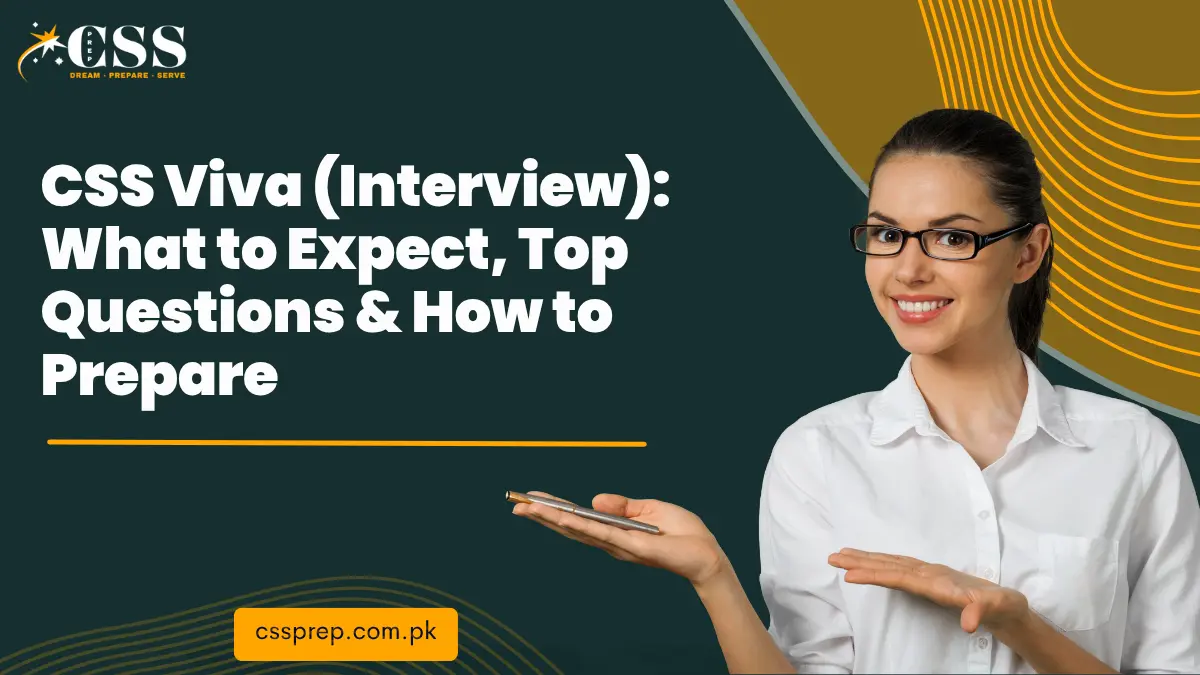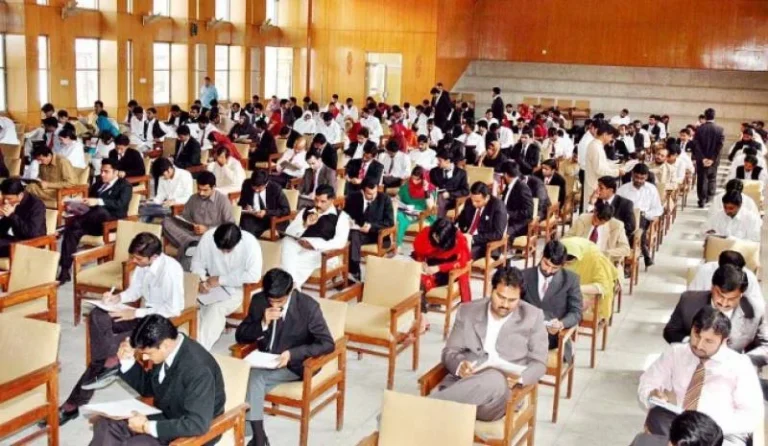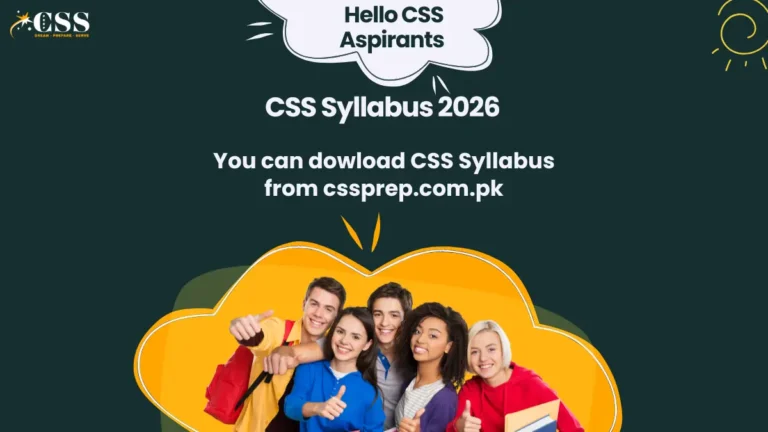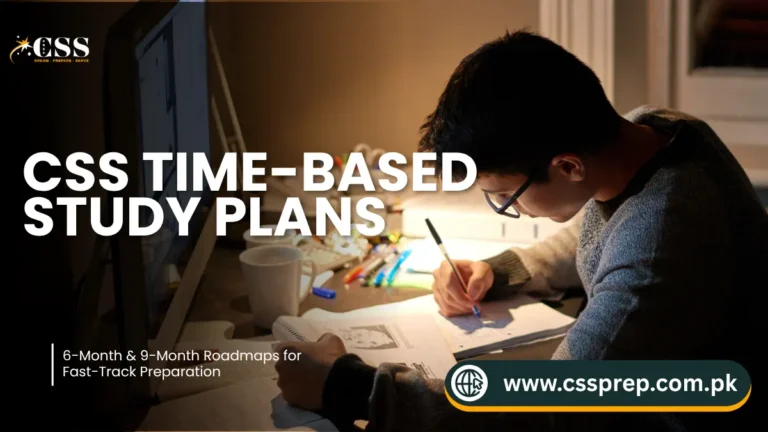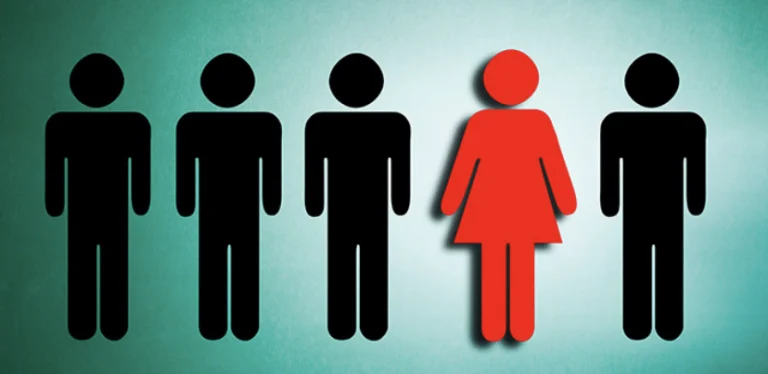CSS Viva (Interview): What to Expect, Top Questions & How to Prepare
The CSS viva (interview) is the final hurdle in your CSS journey. Many students clear the written exam but stumble here because they don’t know what to expect. In this article, we bring you not just theory — but real voices and experiences from successful interviewees. You’ll learn the structure, the panel’s mindset, sample questions, mistakes to avoid, and how to maximize your interview performance.
Why the Viva Matters More Than You Think
- The viva carries 300 marks, which can swing your final merit drastically.
- A solid viva can compensate for minor lapses in your written exam, especially in competition for preferred occupational groups.
- Unlike the written part, the viva tests your personality, communication, composure, general awareness, and honest expression — not just what you’ve memorized.
As one interviewee in a YouTube session said, the panel “doesn’t want a perfect recitation” but to see how you think under pressure.
Structure & Format of the CSS Viva
Here’s what generally happens in a typical CSS interview:
- Panel Composition: 4–5 members, including chairperson and subject-matter experts
- Duration: Around 20 to 30 minutes
- Marks: 300 in total
- Language: English or Urdu, though English is preferred for clarity
- Core Areas: Personal background, motivation, Pakistan Affairs, current affairs, ethics, optional subject linkage
From mock interviews of candidates like those in the YouTube links you shared, we see the panel may begin with your biography / “tell us about yourself”, then gradually move to harder topics in national/international issues.
One candidate recounted:
“They asked me about my hometown, then shifted to questions on Pakistan’s CPEC policy, and finally about my optional subject. It flowed from easy to harder.”
This gradual progression helps the panel assess your comfort and depth.
Key Qualities the Panel Assesses (From Real Interview Insights)
Based on multiple real and mock interviews, panelists consistently look for:
- Confidence & Calmness under Pressure
In one interview video, the panel paused for a few seconds after a question, waiting for the candidate to collect themselves. Candidates who rushed or stuttered lost points. - Clarity & Coherence
One successful candidate avoided long monologues and structured every answer with an opening statement, supporting points, and a conclusion. - Awareness of National & Global Issues
Interviewees were asked about Pakistan’s foreign relations, economic challenges, and regional disputes. One candidate was asked about Pakistan–Afghanistan relations immediately. - Honesty & Authenticity
A recurring tip from interviewed candidates: don’t pretend you know everything. It’s okay to admit “I’m not fully informed on that topic” rather than bluff. - Suitability for Public Service / Ethical Integrity
Some candidates reported questions like: “If you were offered a bribe, how would you respond?” These test your moral reasoning and character.
Most Common CSS Viva Questions & Themes (with Experience-based Examples)
Drawing from interviews and candidate accounts, here are common CSS viva questions:
| Theme | Sample Question | What Interviewees Reported |
|---|---|---|
| Personal / Background | “Tell us about yourself.” | Candidates said they began with their education, hometown, motivations, and strengths. |
| Motivation / Group Choice | “Why civil service?” / “Why your first choice group?” | Panelists probed whether candidates had clear, reasoned answers beyond prestige. |
| Pakistan Affairs / Economic Policy | “What do you think about Pakistan’s fiscal deficit?” | One candidate was asked: “How will you increase tax-to-GDP ratio?” |
| Foreign Policy / Geopolitics | “What is your view of Pakistan–China relations?” / “How should Pakistan respond to pressure from neighboring countries?” | Interviewees reported questions on CPEC, IPI, regional tensions, etc. |
| Optional Subject / Specialization | “How does your optional subject relate to public service?” | Candidates tied their academic strengths to real-world governance problems. |
| Ethics & Dilemmas | “If your superior orders an unethical act, what would you do?” | Many reported scenario-based ethical questions. |
One candidate who appeared in a shared interview video mentioned that panelists asked two consecutive questions from her optional subject, demonstrating how deeply they may probe your specialization.
Sample Q&A (Using Real Interview Insights)
Q: Why do you want to join the civil services?
Ans: Growing up in a small village, I witnessed educational and health disparities that limited people’s opportunities. Through civil service, I aim to work on policy reforms, especially in rural education, to ensure that future generations get fair chances. My academic background in public policy gives me a solid foundation to propose evidence-based solutions.
Q: How would you address Pakistan’s revenue shortfall?
Ans: I believe the key is widening the tax net, reducing exemptions, improving documentation, and using technology for tax administration. Also, reforms in the agriculture and informal sectors can help bring more taxpayers into the system.
Q: What is one foreign policy challenge facing Pakistan, and how would you respond?
Ans: One major challenge is balancing relations between global powers. I think Pakistan should diversify its diplomatic ties, maintain strategic autonomy, and strengthen regional cooperation (e.g., with neighbors) while ensuring national interests are protected.
These sample answers reflect how candidates in recorded interviews stood firm, connected their knowledge, and avoided vague rhetoric.
Preparation Strategy – With Lessons from Real Interviews
Here’s how you can prepare, incorporating what interviewees found useful:
- Know Yourself Inside Out
Interviewees reported that the first few minutes of the viva are about their personal story. Be ready to speak naturally—it sets the tone. - Stay Updated with Current Affairs (Daily Habit)
In many interviews, panelists asked recent news events. One candidate was asked about a policy announced just weeks before the interview. Regular reading of DAWN, Express Tribune, The News helps. - Link Optional Subject to Real Life
Candidates who tied their academic expertise to governance or public policy were viewed more favorably. - Mock Interviews Under Real Conditions
Many students in the shared YouTube videos said they benefited from live mock interviews where they weren’t allowed to see questions beforehand. That helps simulate pressure. - Record Yourself
One interviewee said he recorded his mock answers and listened back to see hurried speech, filler words, and clarity. That feedback loop helped him improve. - Polish Communication & Posture
Good diction, calm tone, eye contact, and composed body language — all repeated by candidates in interviews — make a strong impression. - Be Ready for Surprises
Some interviewees were asked unusual or less-expected questions (e.g. cultural, philosophical). You can’t prepare for everything, but humility and calm under pressure help.
Common Mistakes Observed in Real Interviews
- Rambling or going off-topic: Some candidates derailed by long stories instead of structured responses.
- Over-confidence or arrogance: A few reported being interrupted by panelists when they seemed overly bold.
- Lack of current affairs depth: Those unable to back their answers with facts lost credibility.
- Weak body language: Slouching, lack of eye contact, or fidgeting were flagged in many mock sessions.
- Trying to “sound smart” without substance: Panelists favored sincerity over showy vocabulary.
One interviewee said:
“I saw someone attempt to answer almost every question with a long quote; the panel asked him to stop and speak in his own words.”
That teaches you that simplistic, lucid speech often trumped “fancy” language.
Voices from Interviews (YouTube Samples You Provided)
From the videos you shared:
- In one session, a candidate described the progression of questions: they began with personal background, then asked about national security and economic corridors, and ended with an optional subject question.
- Another interviewee mentioned the warm start: the panel asked light questions first to relax the candidate before diving deeper.
- In a third video, a candidate said she was asked three follow-up questions from a harsh economic policy query—reflecting that panels expect depth, not superficial answers.
- A candidate recalled being paused for silence after a tough question, which pressured them; they said they practiced staying calm in silence during mock drills to prepare for that scenario.
These real experiences align well with what top aspirants often report, confirming that the panel’s approach is designed to test depth, composure, and clarity.
Final Tips & Checklist (with Real Interview Wisdom)
Stay calm even if a panelist challenges your answer — respond with logic, not defensiveness.
Keep your introduction crisp: 1–2 minutes about you, your motivation, your strengths.
Start with easier questions, then shift to tougher ones — that’s how interview flow often goes.
Always structure your answers: Opening + 2–3 points + brief conclusion.
Use real examples or related facts. Don’t just speak generally.
Embrace pauses / thinking time — silence is okay.
Dress neatly in formal attire; first impression matters.
Practice answering both expected and curveball questions.
Don’t bluff. If unsure, say so respectfully.
Frequently Asked Questions (FAQs)
“Have you faced the CSS viva? Share your experience in the comments below to help future aspirants!”“If you want to know about CSPs’ salaries, perks, and privileges, click here to explore the full details

